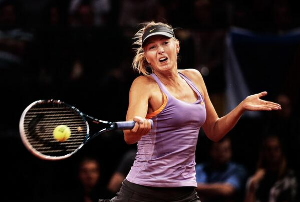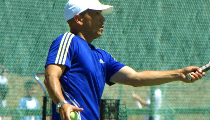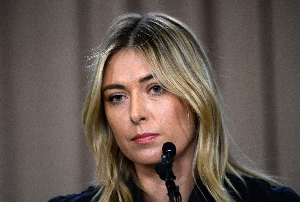OPINION: Sharapova and Politics in Sports
West Bans Maria Sharapova Retroactively For Taking Eastern-Made Aspirin?
March 14 2016: ITS Beeyong Sison – One of the world’s best female athlete and five-time Grand Slam champion Maria Sharapova, was suspended from continuing her brilliant career.
This is due to her use of a medicine, which she has been taking under doctor’s prescription for the past ten years that was suddenly declared a “performance-enhancing drug” and a “metabolic modulator” retroactively in January 1, 2016. The International Tennis Federation (ITF) has said Sharapova will be provisionally banned from March 12.
The former World No.1 Sharapova addressed reporters in Los Angeles last week revealing that according to the ITF, she had failed a drug test during the Australian Open in January. Born in Nyagan, Russia, the 2012 Olympic Silver-Medalist explained she began taking a Latvian-made drug in 2006 to treat a number of health problems, including persistent flu symptoms, low magnesium levels and irregular EKG results or heart arrhythmias.
Retroactive ruling by criminalizing a legal behavior and changing the rules of evidence is unacceptable. The distinction they draw between which medicines should be allowed, and which should be banned, says a lot about their arbitrary assumptions.
Distributed in Eastern European countries as an anti-ischemia, MILDRONATE is a limited-market pharmaceutical manufactured mostly by GRINDEKS of Latvia company with offices in thirteen Eastern European countries as a treatment for heart conditions. The company identifies it as one of their main products. It had sales of 65 million euros in 2013.
According to Sharapova’s doctor, she suffers from irregular heartbeat (arrhythmia) and magnesium deficiency. There is diabetes in her family history, and doctors saw signs that she was also developing the disease. The medicine in question was not designed to improve athletic performance but to specifically protect athletes’ hearts as they are extended to grueling limits.
For athletes, arrhythmias commonly occur when the electrical impulses which coordinate their heartbeats do not work properly causing an athlete’s heart to beat too fast, too slow or irregularly. American Melanie Oudin, a quarterfinalist at the U.S. Open in 2009, suffers from it and had to put a stop to her budding tennis career. In 2015 alone, there were 100 to 150 cases of athletes dying of heart attack.
 Five-time Grand Slam Champion Sharapova is the highest paid female athlete for 11 consecutive years. Photo porsche-tennis.de
Five-time Grand Slam Champion Sharapova is the highest paid female athlete for 11 consecutive years. Photo porsche-tennis.de
Somehow, it is this element of the medicine that caused the World Anti-Doping Agency (WADA) to conclude that the medicine “facilitates recovery from exertion” and, thereby, enhances physical capabilities. A WADA spokesman said on Monday that Meldonium was added to its Prohibited List because of evidence athletes were using it ‘with the intention of enhancing performance’. But reports claim there is little scientific support for its use as an athletic enhancer.
WADA announced the decision on its website only three months before the ban came into force, and it was also announced by the Russian anti-doping agency. Sharapova said she received an email from WADA linking to this information but did not see Mildronate because it was under another name: Meldonium.
Several athletes are known to have been using it before it was banned and deemed illegal. Speed Skaters Semion Elistratov and Pavel Kulizhnikov; Ethiopia’s Endeshaw Negesse and Abeba Aregawi of Sweden, both competing in Athletics recently failed the retroactive ruling. Others from Russia, Georgia, and Ukraine followed suit. The medicine is not approved in the United States by the Food and Drug Administration but easily available over the counter in many Eastern European countries where it was first developed.
There is a big difference between taking a drug that is on the prohibited list and taking a medicine that becomes banned while using it.
GRINDEKS Pharmaceutical said in a statement that it did not believe Meldonium’s use should be banned for athletes. The drug worked mainly by reducing damage to cells. Meldonium “is used to prevent death of ischemic cells and not to increase performance of normal cells,” it said in a statement. “Meldonium cannot improve athletic performance, but it can stop tissue damage in the case of ischemia,” which is lack of blood flow to the heart.
The inventor of meldonium Ivars Kalviņš has also criticized the ban, saying that WADA had not presented scientific proof that the drug can be used for doping. According to him, Meldonium doesn't enhance athletic performance in any way, and was rather used by athletes to prevent damage to the heart and muscles caused by lack of oxygen during high-intensity exercise. He claimed that not allowing athletes to take care of their health is violation of human rights, and that decision was made either out of bias against Eastern European athletes or to take out competition.
Wait a minute. Isn’t this the same as Aspirin? Like Mildronate, Aspirin is a non-steroidal anti-inflammatory drug effective in treating muscle aches, fever, pain, heart attacks and inflammation in the body. It also prevents blood clots. Aspirin also reduces risk of “ischemic attacks” and unstable angina.
Doesn’t Aspirin also “facilitate recovery from exertion” and, thereby, enhance physical capabilities - which WADA asserts on the effects of Meldonium? A December 2015 study in the journal Drug Testing and Analysis argued that Meldonium "demonstrates an increase in endurance performance of athletes, improved rehabilitation after exercise, protection against stress, and enhanced activations of central nervous system functions". Sounds to me like Aspirin. Walks like a duck, quacks like a duck, it is a DUCK!
Athletes readily consume Aspirins - anti-inflammatory drugs to treat exercise-induced muscle pain and joint aches. In 2002, it was revealed that over 90% of NFL teams give non-steroidal anti-inflammatory drugs (NSAIDs) to their players on game day. Clearly this is performance enhancing drug, and yet Aspirin to this date is not banned?
 Former ATP Tour star Cecil Mamiit says Sharapova is the hardest working athlete he trained with. Photo taken in 2012 after winning French Open. Courtesy of C.Mamiit Facebook
Former ATP Tour star Cecil Mamiit says Sharapova is the hardest working athlete he trained with. Photo taken in 2012 after winning French Open. Courtesy of C.Mamiit Facebook
What’s next? Ban Bananas? It is well-known that consuming bananas also lowers risk of death from ischemic heart disease compared with those who consumed less potassium. A favorite snack by tennis players, high potassium intakes are also a protection against loss of muscle mass, preservation of bone mineral density. Bananas have long been valued by athletes for prevention of muscle cramps. Bananas” facilitate recovery from exertion” and, thereby, enhance physical capabilities. Shall we also see if WADA will investigate Sharapova for having eaten tons of this stuff? What next? Pickle Juice?
This issue raises a basic question about the drug testing programs. Drug testing was originally introduced primarily to protect athletes from harm - performance enhancement was a secondary aim. While a medicine that alleviates the aches and pains of an athlete may not enhance performance, it does at the time it is administered increase performance from the reduced level while injured and/or in pain. Pain is supposed to be the body's mechanism to avoid overuse and damage of the body, therefore continuing to compete while hurt is conducive to permanent damage.
Before drawing conclusions and judgments on who is right or wrong, the point that needs to be cleared first is this: For a popular medicine and a widely used legal therapeutic drug to be included in the “verboten” list for athletes, there must first be a review or a public discourse. It should have been announced to their respective governing bodies and deliberated giving both the authorities and their athletes to be informed as to settle in their positions based on scientific and medical evidence.
Once a decision is made to ban the medicine and is proven to be a “performance enhancing” substance, there should have been a grace period or advance notice for athletes so they may have time to clear their system of the medicines traces and to use other medicines to protect their health.
And here’s the hypocrisy, if Sharapova were playing under the authority of the United States Men’s National Hockey League, she legally could continue to use Meldonium through at least the Stanley Cup playoffs because it won’t appear in the list until at least next season. The league performance-enhancing-drug program’s joint committee meets once a year, during each off-season before September 1: To review and update its prohibited substance list. Teams and athletes will have ample time to be educated and be fully informed on the matter.
This issue clearly was not given a chance and due process was denied to Sharapova and the other athletes receiving the suspensions. The legal medicine MILDRONATE was added to the prohibited list on January 1 under the name of MELDONIUM, which was not recognized by Sharapova and her team. Obviously, the drug did not have enough time to clear her body in time for the Aussie Open which started January 16. Same thing happened to the aforementioned fellow Russian Semion Elistratov several weeks ago during the World Sprint Speed Skating Championships held on 27–28 February 2016.
Ex Post Facto Laws
 IOC's Thomas Bach proposed an overhaul of the World Anti-Doping Agency’s or WADA operations. Photo olympic.org
IOC's Thomas Bach proposed an overhaul of the World Anti-Doping Agency’s or WADA operations. Photo olympic.org
Despite the chorus of condemnation, Sharapova is not a cheater. She is one of the most hard-working professionals of the game. A closer look at the drug she took and the World Anti-Doping Agency's process clearly shows her punishment doesn't fit her crime. Reading from the western Main Stream Media, Sharapova was immediately proclaimed as “failing a drug test”. She is suddenly a criminal, a cheat, and must be burned at the stake without the benefit of a trial. It appears that WADA is being selective in its narrow interpretation of its ruling.
There is a big difference between taking a drug that is on the prohibited list and taking a medicine that becomes banned while using it. Retroactive ruling by criminalizing a legal behavior and changing the rules of evidence is unacceptable. The distinction they draw between which medicines should be allowed, and which should be banned, says a lot about their arbitrary assumptions.
Retroactive law, also known in Latin as an “ex post facto” law, "after-the-fact" laws provide for the infliction of punishment upon a person for some prior act that, at the time it was committed, was not illegal. This is considered a hallmark of tyranny because it deprives people of a sense of what behavior will or will not be punished and, allows for random punishment at the whim of those in power.
Even the founders of the U.S. Constitution prohibited this suppressive law considering the historical tendency of government agencies to abuse power. Alexander Hamilton said, "It is easy for men to be zealous advocates for the rights of the citizens when they are invaded by others, but as soon as they have it in their power, to become the invaders themselves."
WADA official Dick Pound, who is trying to get Russian athletes banned from the 2016 Olympic Games in Brazil, was the first to throw verbal punches toward Sharapova saying that she was “reckless beyond description” and guilty of “a big mistake.” His comments and irresponsible assertions clearly beg more questions about his own character and the integrity of WADA themselves. Pound rubs it in further saying, “How stupid can you be? What was she thinking of and her advisors? If you’re taking medicine, surely you or someone else around you checks if it’s on the list?”
To further elaborate their role, WADA is not a testing agency. WADA is the international, independent organization responsible for setting the standards for anti-doping and harmonizing the fight against doping in sport. WADA is funded by the Olympic Movement and governments from around the world and its activities emanate from the responsibilities given to it by the World Anti-Doping Code.
The Code is the core document that provides the framework for anti-doping policies, rules and regulations within sport organizations and among public authorities. Testing programs are conducted by International Federations (IFs) and National Anti-Doping Organizations (NADOs), while the International Olympic Committee (IOC) and International Paralympic Committee (IPC) are responsible for testing during the Olympic and Paralympic Games respectively.
Last November, IOC President Thomas Bach proposed an overhaul of the World Anti-Doping Agency’s or WADA operations including the creation of independent testing and professional intelligence-gathering units to avoid the type of scandals that have embroiled numerous National Sporting bodies. Bach recommended that all doping sanctions be handed down by the court of arbitration for sport, rather than by individual sports bodies or WADA. “
Bach is basically asserting the right of IOC’s independence and protection from external influence especially from governments with questionable agendas. IOC Charter states its fundamental principle: “Recognizing that sport occurs within the framework of society, sports organizations within the Olympic Movement shall have the rights and obligations of autonomy, which include freely establishing and controlling the rules of sport, determining the structure and governance of their organizations, enjoying the right of elections free from any outside influence and the responsibility for ensuring that principles of good governance be applied.”
Many sports leaders are calling again for “Separation of State and Sport”. Moscow came to the defense of Sharapova demanding some straightforward answers, as against receiving “under-hand” serves. The situation is being politicized at the detriment of sports.
Russian Foreign Minister Sergei Lavrov is demanding explanations from WADA following the inclusion of Meldonium drugs in the list of banned medicines. "The WADA is a mechanism designed to make sure that doping isn't used in sports. The recent move by this organization has raised questions among professionals. The questions should be answered professionally and honestly," Lavrov stated.
Even the Kremlin has weighed in with a statement. "Attempts to politicize sports, attempts to add character to sports of some kind of political instrument for achieving some aims, are destructive for sports, for international sports, and are unacceptable and inexcusable," Presidential Spokesman Dmitry Peskov told reporters.
The statuesque 28-yearold Russian is the most recognizable figure. According to Forbes, Sharapova is the highest paid female athlete for 11 consecutive years. Although Sharapova has lived in Brandenton, Florida since she was 7 years old, she never considered applying for American citizenship, crediting her Russian heritage for her success stating, “I was shaped into the individual I was from those experiences and not necessarily simply the country, but the people, the mentality and the toughness and that never-giving-up attitude."
WADA itself has come under criticism from watchdog groups that claim the organization’s methods are imprecise and non-transparent. An editorial by Nature wrote, “Detecting cheats is meant to promote fairness, but drug testing should not be exempt from the scientific principles and standards that apply to other biomedical sciences, such as disease diagnostics. The alternative could see the innocent being punished while the guilty escape on the grounds of reasonable doubt.”
Several sponsors supporting Sharapova have distanced themselves from their prized star-athlete, but Racket manufacturer HEAD came immediately to Sharapova’s defense, and rightly so, issuing a statement:
"As a company, Head has a strict anti-doping policy. We believe the use of WADA-banned substances with the intent to enhance performance or gain unfair advantages must be sanctioned. In Maria’s Sharapova’s case, we have analyzed the facts and circumstances in great detail in order to reach a firm conclusion about our association with her in light of her recent announcement.
The facts as we know them today are that since 1 January 2016, Wada has banned the usage of meldonium and that Maria has taken Mildronate and other medications since 2006 as a result of the frequency by which she had the flu, abnormal EKG results and indicators of diabetes with a family history of diabetes. Mildronate is another name for Meldonium.
On this basis we conclude that although it is beyond doubt that she tested positive for the use of a Wada-banned substance, the circumstantial evidence is equally beyond doubt that the continued use of Meldonium after 1 Jan 2016 in the dosages she had been recommended, which were significantly short of performance enhancing levels, was a manifest error by Maria. In the absence of any evidence of any intent by Maria of enhancing her performance or trying to gain an unfair advantage through the use of Mildronate, we further conclude this falls into the category of ‘honest’ mistakes.
Furthermore, we question Wada’s decision to add meldonium to its banned substances list in the manner it did; we believe the correct action by Wada would have been to impose a dosage limitation only. In the circumstances we would encourage Wada to release scientific studies which validates their claim that meldonium should be a banned substance.
The honesty and courage she displayed in announcing and acknowledging her mistake was admirable. Head is proud to stand behind Maria, now and into the future and we intend to extend her contract. Maria may have made a mistake, but she has earned the benefit of the doubt and we are extending it to her. We look forward to many more years of working with Maria."
In response, WADA’s current president, Craig Reedie said: “Perhaps people should recall an exercise in scientific research, followed by a year of monitoring before the list committee decided to place the product on the prohibited list.”















